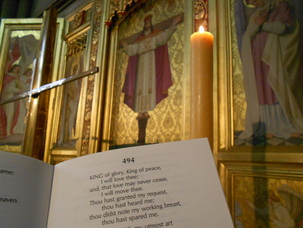
Today, I have an earworm I'd like to share. It's the hymn tune Gwalchmai, written by J D Jones (1827-1870) for George Herbert's poem, 'King of glory, king of peace, I will love thee.'
George Herbert died on this day in 1633, just short of his fortieth birthday. He came from an aristocratic Welsh family, and his early career was illustrious. He went to Westminster School and Cambridge, became a Fellow of Trinity College, Public Orator in the University, and then an MP.
He was made Deacon in 1626 and ordained Priest in 1630, taking the living of Bemerton just across the water-meadows from Salisbury. He was considered saintly and diligent in parish duties, but had ample time to devote himself to writing and poetry.
Most of his poems were published posthumously in 1633 in a volume entitled 'The Temple'. Some remain familiar, 'Teach me, my God and King' and 'Let all the world in every corner sing' among them. But the collection is far more substantial. The themes and the layout of the poems represent the layout and purpose of a church building.
He also wrote 'A Priest to the Temple, or the Country Parson', a handbook for clergy published in 1652. It gives us an idealised picture of the priest's role and way of life in a society very different from our own. It has been influential in shaping public perceptions of how clergy should be, not always helpfully - what is appropriate and achievable in a tiny 17th-century community in an hierarchical society is not necessarily appropriate and achievable today!
Herbert's poem Lent includes the following stanza. It encourages us to do our best in walking the way of faith, striving as far as we are able; and striving too to live lives which are holy.
It's true, we cannot reach Christ's forti'eth day;
Yet to go part of that religious way,
Is better than to rest:
We cannot reach our Saviour's purity;
Yet we are bid, 'Be holy ev'n as he, '
In both let's do our best.
George Herbert died on this day in 1633, just short of his fortieth birthday. He came from an aristocratic Welsh family, and his early career was illustrious. He went to Westminster School and Cambridge, became a Fellow of Trinity College, Public Orator in the University, and then an MP.
He was made Deacon in 1626 and ordained Priest in 1630, taking the living of Bemerton just across the water-meadows from Salisbury. He was considered saintly and diligent in parish duties, but had ample time to devote himself to writing and poetry.
Most of his poems were published posthumously in 1633 in a volume entitled 'The Temple'. Some remain familiar, 'Teach me, my God and King' and 'Let all the world in every corner sing' among them. But the collection is far more substantial. The themes and the layout of the poems represent the layout and purpose of a church building.
He also wrote 'A Priest to the Temple, or the Country Parson', a handbook for clergy published in 1652. It gives us an idealised picture of the priest's role and way of life in a society very different from our own. It has been influential in shaping public perceptions of how clergy should be, not always helpfully - what is appropriate and achievable in a tiny 17th-century community in an hierarchical society is not necessarily appropriate and achievable today!
Herbert's poem Lent includes the following stanza. It encourages us to do our best in walking the way of faith, striving as far as we are able; and striving too to live lives which are holy.
It's true, we cannot reach Christ's forti'eth day;
Yet to go part of that religious way,
Is better than to rest:
We cannot reach our Saviour's purity;
Yet we are bid, 'Be holy ev'n as he, '
In both let's do our best.
 RSS Feed
RSS Feed